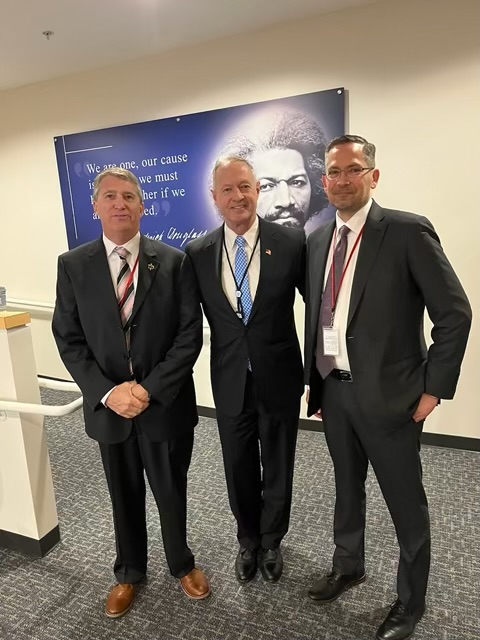Avard Law Attorneys Meet Commissioner of Social Security Administration to Advocate for Clients in Face of Delays
Pictured: Avard Law’s Attorney Douglas Mohney traveled to Washington DC and Baltimore MD to meet with the Commissioner of the Social Security Administration. Also shown is David Camp CEO of National Organization of Social Security Representatives (NOSSCR).
Avard Law’s Attorney Douglas Mohney was invited to Washington DC on February 21, 2024 to meet with Commissioner Martin O’Malley and his top deputies to discuss the impact the delays in Social Security Disability cases are having on Avard Law Clients.
Commissioner O’Malley said he is dedicated to resolving these issues and has committed the agency to doing all it can to reducing the backlog. The Commissioner invited Attorney Mohney to spend most of the day at SSA Headquarters in Baltimore and attend several meetings regarding improving the efficiency of SSA.
The realty of the situation for applicants of Social Security Disability:
Once someone has submitted an application for disability benefits, the national average has increased to greater than 7 months for an initial decision as reported in the Social Security Administration’s State Agency Monthly Workload Data.
The national average wait for a reconsideration by the SSA, the first step in appealing a denied claim, is seven months. If reconsideration is denied, It takes another 15 months on average to get to the next step, a hearing before a Social Security administrative law judge.
This total span of time for most people far exceeds 2 years. With less than 40% of initial applications being approved by SSA, millions of individuals who need assistance are being forced to wait for long periods of time in typically less than ideal living situations.
An estimated 8,000 applicants file for bankruptcy and 10,000 die each year while awaiting a decision on their disability benefit application.
David Camp (CEO NOSSCR) testified before Congress in late 2023:
Recommended administrative changes included:
- Relying on treating physicians rather than third-party paid examiners.
- Eliminating reconsideration in the slowest states – if not all. The second step adds an average of 210 days to the process, and more than 300 days in two states—Florida and South Carolina.
- The Division of Disability Determinations, as with all State agencies responsible for making disability decisions for SSA, is funded by the federal government. Federal regulations in turn mandate minimum performance standards from these State agencies for accuracy and timeliness. The maximum processing time threshold for Social Security Disability Insurance claim processing is 49.5 days (20 CFR § 404.1642). As of December 2022, the Florida Division of Disability Determinations average processing time was 225 days, a nearly 200% increased from 77 days in 2019.
- When a State agency is unable to meet minimum performance standards for two or more consecutive calendar quarters SSA is mandated to provide performance support to the agency to ensure it is able to meet those standards (20 CFR § 404.1650 and 404.1661). If a State agency persistently fails to meet those standards SSA is directed to assume partial or complete control of the agency’s disability determination functions (20 CFR § 404.1670).
- Eliminating requirements for a permanent physical address. Many homeless and transient applicants are unable to meet this requirement and are effectively denied access to the application process.
- Eliminating e-signature verification, streamlining the process and saving valuable time and resources.
Local and national support is needed to resolve the issues:
Avard Law stands as a steadfast advocate for individuals navigating the complexities of the Social Security Disability system, supported not only by our dedicated legal team but also by a continuation of client communication directed at local state governments and the work of organizations such as NOSSCR. Our collaborative efforts reflect a unified commitment to ensuring that justice and assistance are swift and accessible to all, transcending geographical boundaries and bureaucratic hurdles. As we press forward, let us harness the power of collective action to drive meaningful change and uphold the rights of every individual in need.

